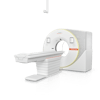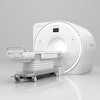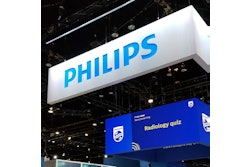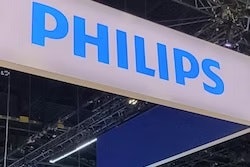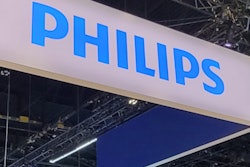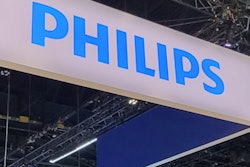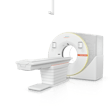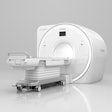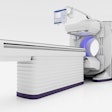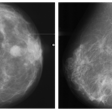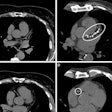CHICAGO – Philips brought a range of new AI-enhanced offerings to RSNA 2024 aimed at bolstering efficiency and improving workflows for radiologists and radiologic technologists.
MRI
In MRI, the star of the show was Philips’ next-generation of its 1.5-tesla BlueSeal MR wide-bore scanner. Available in two versions -- SE and UE -- the new scanner features a 70 cm design and integrated AI-enabled MR Smart Workflow software, the latter of which increases patient throughput without compromising diagnostic quality, the company said.
Philips added that the scanner's performance will be boosted by its Smart Reading technology, which consists of components such as the following: SmartExam for automated MRI exam planning, scanning, and processing; SmartFit coils with flexible bending greater than 90º; SmartSpeed for faster scans and improved image resolution; SmartQuant for AI-powered imaging of multiple anatomies; and SmartReading for AI-based generation of quantitative reports.
Philips teamed up with icoMetrix for AI analysis of neurological conditions such as Alzheimer’s and multiple sclerosis and also partnered with Quibim for AI assessment of prostate cancer.
The scanner is also preloaded with seven liters of helium, which Philips said never needs refilling, even in the event of an emergency shutdown.
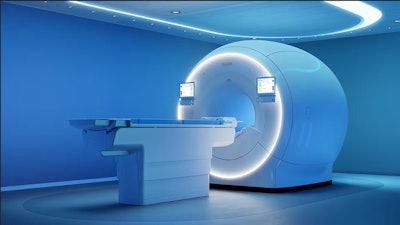 BlueSeal 1.5-tesla MRI scanner.
BlueSeal 1.5-tesla MRI scanner.
Finally, the company said that the scanner is up to 1,700 kg lighter and has no need for a vent pipe. This small footprint allows for flexible installations in new locations, including elevated floors or indoor sites with construction limitations, according to Philips.
What’s more, Philips announced an AI research collaboration with the Mayo Clinic for cardiac MRI. The goal is to shorten complex MRI exams and improve workflow for radiologists, according to the vendor.
Additionally, the research will evaluate the potential of lower-field-strength MRI technology developed by Philips.
CT
First introduced at ECR 2024, CT 5300 took center stage in the company’s booth. The workhorse scanner, which can also handle cardiac scanning, features the use of AI in all operational aspects of the system, according to the vendor. This yields benefits in diagnosis, interventional procedures, and screening, Philips said.
The vendor’s CT Smart Workflow software suite includes its Precise workflow software applications, which are designed to free technologists and radiologists from routine and time-consuming tasks.
CT 5300 features Nanopanel Precise, a new detector developed by Philips specifically for AI-based reconstruction. Making use of the firm’s Precise Image reconstruction software, CT 5300 can achieve up to 85% lower noise and 60% better low-contrast detectability at 80% lower dose in comparison with conventional image reconstruction, Philips said.
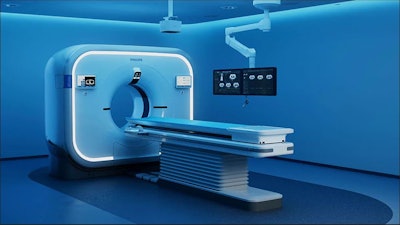 Philips 5300 CT scanner.
Philips 5300 CT scanner.
For cardiac imaging, the Precise Image software combines with Precise CT cardiac software to produce motion-free cardiac imaging in patients with high heart rates or heart rate variability, according to the firm.
Other Precise applications include Precise Position for improving vertical positioning accuracy by up to 50%, increasing user-to-user consistency by up to 70%, and reducing positioning time by up to 23%. Meanwhile, Precise Brain automatically reformats scans to help improve visualization, Philips said.
The scanner also includes virtual tools such as the firm’s CT Collaboration Live service for real-time collaboon and clinical or technical support. In addition, CT 5300 includes access to Philips’ AI-enabled Advanced Visualization Workspace applications.
In other developments, Philips announced a pilot collaboration with AI firm Annalise.ai. The vendor will investigate the feasibility of integrating the Annalise Critical Care AI triage software for prioritizing time-sensitive clinical findings involving chest x-rays and non-contrast brain CT exams.
Informatics
Philips also devoted attention to the latest U.S. Food and Drug Administration 510(k) clearance for its Radiology Operations Command Center (ROCC) Console software device. Designed to streamline radiology operations and workflows, the new remote scanning and remote protocol management features enable imaging experts to collaborate in real-time with onsite technologists, virtually anywhere, according to the vendor. Philips also highlighted the benefits of ROCC when used with a mobile MRI service.
Philips also announced an expansion to its strategic collaboration with Amazon Web Services (AWS). Under the new partnership, AWS will offer the company’s integrated diagnostics portfolio in the cloud, encompassing Philips’ radiology, AI advanced visualization, cardiology, and digital pathology offerings. In addition, Philips plans to create generative AI applications that leverage foundation models from Amazon Bedrock and integrate them into clinical workflows.
Ultrasound
Philips pointed to the latest releases of its Epiq Elite and Affiniti ultrasound scanners in the ultrasound section of its booth. These updates bring new workflow and quantification automation designed to make exams faster and reproducible, according to the vendor.
The company said it now has more than 100 optimized presets across multiple clinical applications that can, for example, deliver 50% faster image optimization during abdominal and obstetrics exams.
Interventional
Company executives focused on recent upgrades to its Azurion 7 platform for image-guided interventional procedures. These enhancements yield 17% faster procedure times and 12% faster patient preparation time, according to the vendor. As a result, one more patient could be treated per day on the system.
For full 2024 RSNA coverage, visit our RADCast.
